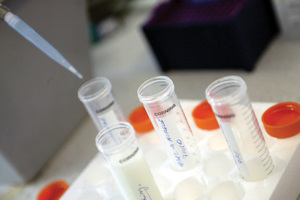Review of Life Sciences and Cognate Disciplines
25 Jun 2015
Message from the President and Vice-Chancellor

A meeting of Senate on Wednesday, 24 June 2015 endorsed the overall principles put forward by the Review Group which I asked to consider the future of Life Sciences and cognate disciplines at the University.
The key recommendation, which received strong backing from Senate, is that the University should be reconstituted so that all academic activity is organised around three Faculties, moving different component parts of the current Faculty of Life Sciences into two other Faculties: the Faculty of Medical, Biological and Human Sciences and the Faculty of Science and Engineering (working titles). This is likely to require reconstitution and reorganisation of the current Faculty of Medical and Human Sciences, and expansion of two of the Schools in the current Faculty of Engineering and Physical Sciences. This, and further recommendations listed below, will now be discussed by the University’s Board of Governors at a meeting on 8 July, where final approval will be sought.
Senate endorsed the strong view of the Review Group that this way forward offers the greatest potential for the University to achieve its aims to be in a leading global position across the life sciences. It creates the opportunity to achieve focus and concentration in key areas which have been previously fragmented. Benefits will result from synergies and critical mass and also from the clear profile that could be gained. It will open up real opportunities for the investment in life sciences, which is a critical area of scientific endeavour with significant and broad societal value.
Detailed Recommendations
The Review Group identified a significant number of barriers and challenges in our current operating model which it found are preventing the University from realising its strategic goals.
Senate discussed the report and the wider recommendations within it (listed below), which will now be considered further as part of the implementation:
- Indicative structures should be based around discipline strengths and designed to optimise the opportunities identified by the Review and to enable life sciences and cognate disciplines to reach their full potential and contribute significantly to the University achieving its 2020 goals.
- The detail of any final structures – and change to Faculty names – will be finalised during implementation and should be a matter for those most closely involved. Further consultation on the exact Faculty structures will be undertaken, ahead of seeking Senate endorsement for them.
- The proposals made by the Review Group are, however:
o biomedical-facing activities currently located in the Faculty of Life Sciences should transfer to appropriate Institutes or Schools in a reformed Faculty of Medical, Biological and Human Sciences (working title);
o a wider realignment of neuroscience capability in the current Faculty of Life Sciences and Faculty of Medical and Human Sciences;
o transfer of industrial biotechnology and/or biophysical chemistry researchers in MIB to the School of Chemistry in an expanded Faculty of Science and Engineering (working title);
o combination of those in the research themes of environment and ecology, and computational and evolutionary biology with the School of Earth, Atmospheric and Environmental Sciences in an expanded Faculty of Science and Engineering (working title);
o transfer the Centre for the History of Science, Technology and Medicine to a reformed Faculty of Medical, Biological and Human Sciences (working title);
o establish networks for broad integrating communities across the University for the majority of biological sciences;
o biology, biomedical and biochemistry undergraduate teaching programmes transfer to a reformed Faculty of Medical, Biological and Human Sciences (working title);
o once the academic structures are agreed, then the PSS support structures will be determined.
Next steps
Having been endorsed by Senate, the recommendations will be discussed at the Board of Governors meeting taking place on Wednesday, 8 July, where final approval will be sought.
The Review then makes the following recommendations about managing the transition to the new University structure:
- The transition should start on 1 August 2015 to limit the period of uncertainty for staff. The proposal of change of names of Faculties and any Schools could be considered by Senate in November 2015 with the new structures coming fully into operation by 1 August 2016. An appropriate overarching University leadership and management team will be constituted to coordinate the transition process across the three Faculties.
- The Vice-Presidents and Deans of the Faculty of Medical and Human Sciences and Faculty of Engineering and Physical Sciences should lead the process of forming the new structures, ensuring that there is appropriate involvement of Faculty of Life Sciences staff in that process.
- For the period leading up to 1 August 2016, an interim Faculty of Life Sciences management group will oversee the ongoing business of the Faculty.
- Short-term investment should be committed to support the transition and implementation including internal and external communications to key stakeholders, covering staff, students, alumni and other key external groupings.
- Initiatives should be established for cross-functional working to drive the interaction.
- Whilst it is not envisaged that major staff relocation will take place, a review of space, including planned occupancy and usage of new buildings and facilities, will be led by the Directorate of Estates and Facilities
An open meeting for academic and research staff in the Faculty of Life Sciences will be held on Friday, 26 June at 10am in Stopford Lecture Theatre 1. An open meeting for Professional Support Services staff in the Faculty of Life Sciences will be held on Friday, 26 June at 11am in Stopford Lecture Theatre 1.
An open meeting for all staff in the Faculty of Medical and Human Sciences will be held on Friday, 26 June at 12 noon in Roscoe Lecture Theatre A. Regular communications are planned throughout the transition and integration process.
The full report of the Review Group can be found at:
Professor Dame Nancy Rothwell
President and Vice-Chancellor
